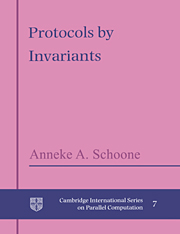
- Publisher:
- Cambridge University Press
- Online publication date:
- March 2010
- Print publication year:
- 1996
- Online ISBN:
- 9780511663123
12th August 2024: digital purchasing is currently unavailable on Cambridge Core. Due to recent technical disruption affecting our publishing operation, we are experiencing some delays to publication. We are working hard to restore services as soon as possible and apologise for the inconvenience. For further updates please visit our website: https://www.cambridge.org/news-and-insights/technical-incident


When several computers have to cooperate to achieve a certain task (i.e. distributed computing) we need 'recipes' (i.e. protocols) to tell them what to do. Unfortunately, human minds are not well suited to keeping track of what might happen given even a very simple protocol. In this book Dr Schoone shows how we can derive properties of those protocols that always hold (i.e. invariants), irrespective of what actually happens in an execution of the protocol. From these invariants the basic attributes of the protocols can be obtained. Each protocol is explained intuitively, proved correct using invariants, and analysed to establish the relation between parameter settings and its essential features. The protocols belong to a wide range of layers in the ISO reference model hierarchy, and include the following: a class of communication protocols that tolerate and correct message loss, duplication, and resequencing; protocols for determining and maintaining routing information, both in a static and a dynamic environment; connection-management protocols; and atomic commitment protocols for use in distributed database management.
 Loading metrics...
Loading metrics...
* Views captured on Cambridge Core between #date#. This data will be updated every 24 hours.
Usage data cannot currently be displayed.